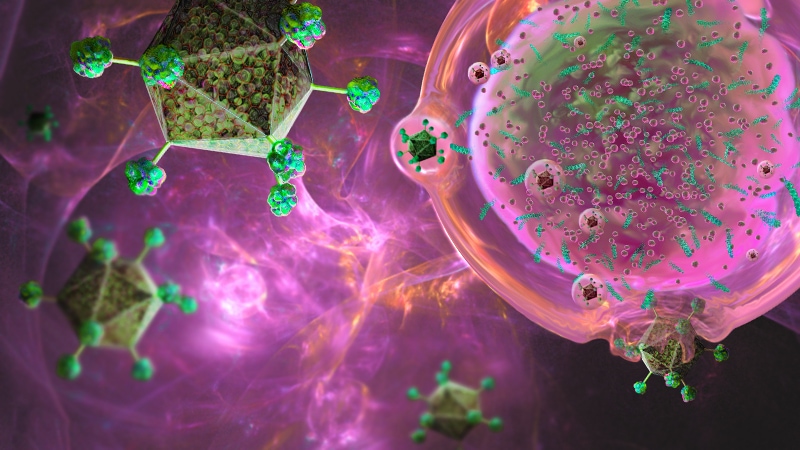Cellular Therapies for Autoimmune Diseases: A Promising Future
Core Concepts
Cellular therapies show promise in treating autoimmune diseases by resetting the immune system.
Abstract
The content discusses the potential of cellular therapies, specifically Chimeric Antigen Receptor (CAR) T-cell therapy, in treating autoimmune diseases. It highlights successful case studies, ongoing clinical trials, and the challenges associated with these therapies. The focus is on the revolutionary impact of cellular immunotherapy on autoimmune diseases.
Revolutionary Treatment for Autoimmune Diseases
CAR T-cell therapy offers a novel approach to treating autoimmune diseases.
Successful cases of drug-free remission in patients with refractory systemic lupus erythematosus.
Mechanism and Effectiveness of CAR T-Cell Therapy
CAR T cells target B cells in tissues more effectively than antibody therapies.
Process involves re-engineering T cells to express chimeric antigen receptors.
Risks and Intensive Nature of Therapy
Lymphodepleting regimen increases the risk of infection.
Patients may experience serious adverse events like cytokine release syndrome.
Alternatives to Standard CAR T-Cell Therapies
RNA CAR T-cell therapy targets specific antigens with reduced side effects.
Regulatory T cells can be engineered to target autoimmune diseases.
Precision Immunotherapy
Precision cellular immunotherapies target autoantibodies expressed only on autoimmune B cells.
Development of therapies like CAAR T-cell therapy for specific autoimmune diseases.
Are Cellular Therapies the Future of Autoimmune Disease?
Stats
"Five patients with refractory systemic lupus erythematosus (SLE) treated with CAR T-cell therapy all achieved drug-free remission."
"Six months after treatment, there were no signs of myositis on MRI and a chest CT scan showed full regression of alveolitis."
"The lymphodepleting regimen increases the risk for infection and patients are commonly hospitalized for a week or more following infusion."
Quotes
"It's an incredibly exciting time. It's unprecedented in the history of autoimmunity." - Dr. Max Konig
"Maybe it's like a tabula rasa: You wipe [the B cells] out and start with a clean slate." - Dr. Carl June
Key Insights Distilled From
by Lucy Hicks at www.medscape.com 09-27-2023
https://www.medscape.com/viewarticle/996883
Deeper Inquiries
How can the intensive nature of CAR T-cell therapy be balanced with patient safety and comfort?
CAR T-cell therapy's intensive nature can be balanced with patient safety and comfort through several strategies. Firstly, optimizing the lymphodepletion regimen to minimize the risk of infection and adverse events is crucial. This involves closely monitoring patients for any signs of complications and providing appropriate supportive care during and after the infusion. Additionally, exploring alternative approaches like RNA CAR T-cell therapy, which does not require lymphodepletion and can be administered in an outpatient setting, can enhance patient comfort while maintaining efficacy. Continuous research and development to improve the precision and safety profile of CAR T-cell therapies will be essential in ensuring patient well-being throughout the treatment process.
What are the potential ethical considerations surrounding the use of cellular therapies for autoimmune diseases?
The use of cellular therapies for autoimmune diseases raises several ethical considerations that need to be carefully addressed. One key concern is the potential for off-target effects, where the engineered T cells may inadvertently target healthy cells, leading to unintended consequences. Ensuring the safety and specificity of these therapies through rigorous preclinical and clinical testing is essential to mitigate this risk. Additionally, issues related to informed consent, patient autonomy, and equitable access to these innovative treatments must be carefully managed. Balancing the potential benefits of cellular therapies with the need to minimize risks and uphold ethical principles will be crucial in the ethical implementation of these advanced treatments.
How might the development of precision cellular immunotherapies impact the future of autoimmune disease treatment?
The development of precision cellular immunotherapies holds great promise for revolutionizing the future of autoimmune disease treatment. By targeting specific autoantibodies or disease-causing cells with high precision, these therapies offer the potential for more effective and tailored treatment approaches. Precision cellular immunotherapies can minimize off-target effects, reduce the risk of adverse events, and enhance treatment outcomes for patients with autoimmune diseases. Furthermore, these therapies may pave the way for personalized medicine in autoimmune disease management, allowing for individualized treatment strategies based on the unique characteristics of each patient's immune system. As research in this field advances, precision cellular immunotherapies are poised to significantly impact the landscape of autoimmune disease treatment by offering safer, more targeted, and potentially curative options for patients.
0
